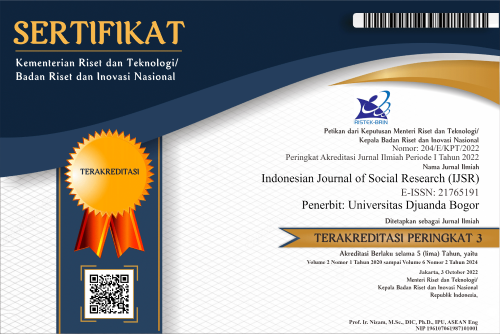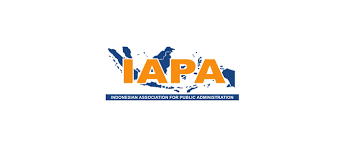Does The Scheme “Free Bus Policy for Women in Public Transportation” Contributes to The Achievement of The Sustainable Development Goals?
Abstract
Tamilnadu, one of the states in India is performing better in achieving Sustainable Development Goals (SDGs) by implementing various schemes and programmes. One such scheme “Free bus travel for women in public transportation”, was launched in June 2021 in an effort to reduce the cost of travel and enhance women’s work participation rates. Women's mobility is essential for increased labour force participation, higher wages and salaries. The aim of this scheme is to help women, especially those who earn a living on a daily basis, become economically independent and free from poverty. Therefore, this study was conducted to analyse the impact of the scheme with the various relevant SDGs. It is a descriptive paper that highlights the policy’s various benefits on women, whether it contributes to the achievement of various sustainable development goals such as Goal 1.4 (access to basic services), Goal 4.3 (Equal access to tertiary education), Goal 5.2 (elimination of violence against women in public and private sphere), Goal 8.5 (decent work) & Goal 11.2 (safe public transportation) using both quantitative survey and qualitative interviews which was carried out among 150 women commuters in Sivagangai District. The scheme was shown to have a good effect on women by assisting them in meeting their practical needs, such as gaining access to markets and schools, and by assisting them in strategically empowering themselves by providing access to social and economic possibilities.
References
Alberts, A., Pfeffer, K., & Baud, I. (2016). Rebuilding women’s livelihoods strategies at the city fringe: Agency, spatial practices, and access to transportation from Semmencherry, Chennai. Journal of Transport Geography, 55, 142–151.
Allen, H. (2018). Approaches for gender responsive urban mobility. Sustainable Transport: A Sourcebook for Policy-Makers in Developing Cities Module 7a. Recuperado de Http://Cort. as/-JuZP.
Anand, A., & Tiwari, G. (2006). A gendered perspective of the shelter–transport–livelihood link: The case of poor women in Delhi. Transport Reviews, 26(1), 63–80.
Andres, L. A., Dasgupta, B., Joseph, G., Abraham, V., & Correia, M. (2017). Precarious drop: Reassessing patterns of female labor force participation in India. World Bank Policy Research Working Paper, 8024.
Banerjee, M. (2019). Gender equality and labour force participation: Mind the gap. ANTYAJAA: Indian Journal of Women and Social Change, 4(1), 113–123.
Bhalla, S., & Kaur, R. (2011). Labour force participation of women in India: Some facts, some queries.
Chakraborty, S. (2020). COVID-19 and women informal sector workers in India. Economic & Political Weekly, 55(35), 17.
Chakraborty, T., &Lohawala, N. (2021). Women, Violence and Work: Threat of Sexual Violence and Women’s Decision to Work.
Chatterjee, U., Murgai, R., & Rama, M. (2015). Job opportunities along the rural-urban gradation and female labor force participation in India. World Bank Policy Research Working Paper, 7412.
Chaudhary, R., &Verick, S. (2014). Female labour force participation in India and beyond. ILO New Delhi.
Choudhary, M., Dube, S., & Verma, R. (2018). Women Safety in Public Transport. LAP LAMBERT Academic Publishing.
Coelho, K., Mahadevia, D., & Williams, G. (2022). Outsiders in the periphery: Studies of the peripheralisation of low-income housing in Ahmedabad and Chennai, India. International Journal of Housing Policy, 22(4), 543–569.
Dhanaraj, S., & Mahambare, V. (2019). Family structure, education and women’s employment in rural India. World Development, 115, 17-29.
Duraisamy, M., &Duraisamy, P. (2016). Gender wage gap across the wage distribution in different segments of the Indian labour market, 1983–2012: Exploring the glass ceiling or sticky floor phenomenon. Applied Economics, 48(43), 4098–4111.
Free bus travel for women in Punjab from today. (2021, April 1). The Indian Express. https://indianexpress.com/article/cities/chandigarh/free-bus-travel-for-women-in-punjab-from-today-7253260/
Guerreiro, C. (2013). Air quality in Europe: 2013 report. India Labour Market Update. (2017). ILO Country Office for India https://www.ilo.org/newdelhi/whatwedo/publications/WCMS_568701/lang--en/index.htm
Jagori, T. (2010). Understanding Woman’s Safety; Toward a Gender Inclusive City.
Jayachandran, S. (2021). Social norms as a barrier to women’s employment in developing countries. IMF Economic Review, 69(3), 576–595.
Lemmon, G. T., & Vogelstein, R. (2017). Building Inclusive Economies: How Women’s Economic Advancement Promotes Sustainable Growth. Council on Foreign Relations® Incorporated.
Mamgain, R. P. (2021). Understanding labour market disruptions and job losses amidst COVID-19. Journal of Social and Economic Development, 23(Suppl 2), 301–319.
Mehta, V., & Sai, H. (2021). Freedom of Movement: Studying Women’s Mobility in North India. Urbanisation, 6(1_suppl), S77–S114.
Shah, S., Viswanath, K., Vyas, S., & Gadepalli, S. (2017). Women and transport in Indian cities. New Delhi, India: ITDP India, 10–11.
Shivakumar, C. (2021, May 10). Stalin’s free bus travel scheme for women wins nationwide accolades. The New Indian Express https://www.newindianexpress.com/states/tamil-nadu/2021/may/10/stalins-free-bus-travel-scheme-for-women-wins-nationwide-accolades-2300870.html
Siddique, Z. (2022). Media-reported violence and female labor supply. Economic Development and Cultural Change, 70(4), 1337–1365.
Singhai, A., &Singhai, K. (n.d.). Gender, Inclusive Transport and Sustainable Development Goals: A Legal Perspective to Transport Policies.
Sudarshan, R. M., & Bhattacharya, S. (2009). Through the magnifying glass: Women’s work and labour force participation in urban Delhi. Economic and Political Weekly, 59–66.
Sukor, N. S. A., Airak, S., & Hassan, S. A. (2021). “More Than a Free Bus Ride”—Exploring Young Adults’ Perceptions of Free Bus Services Using a Qualitative Approach: A Case Study of Penang, Malaysia. Sustainability, 13(6), 3294.
Copyright (c) 2023 Indonesian Journal of Social Research (IJSR)

This work is licensed under a Creative Commons Attribution-ShareAlike 4.0 International License.
The Authors submitting a manuscript do so on the understanding that if accepted for publication, copyright publishing of the article shall be assigned/transferred to Indonesian Journal of Social Research (IJSR) Universitas Djuanda as Publisher of the journal. Upon acceptance of an article, authors will be asked to complete a 'Copyright Transfer Agreement'. An e-mail will be sent to the corresponding author confirming receipt of the manuscript together with a 'Copyright Transfer Agreement' form by online version of this agreement.
Indonesian Journal of Social Research (IJSR) Universitas Djuanda, the Editors and the Editorial Board make every effort to ensure that no wrong or misleading data, opinions or statements be published in the journal. In any way, the contents of the articles and advertisements published in the Indonesian Journal of Social Research (IJSR) Universitas Djuanda are sole and exclusive responsibility of their respective authors and advertisers.
Remember, even though we ask for a transfer of copyright, our journal authors retain (or are granted back) significant scholarly rights as mention before.
The Copyright Transfer Agreement (CTA) Form can be downloaded here: Copyright Transfer Agreement-IJSR 2020
The copyright form should be signed electronically and send to the Editorial Office e-mail below:
Dr. Rasmitadila, M.Pd (Editor-in-Chief)
Universitas Djuanda
Jl. Tol Jagorawi No.1, Ciawi, Kec. Ciawi, Bogor, Jawa Barat 16720
Website: http://journal.unida.ac.id/index.php/IJSR/index
Email: ijsr@unida.ac.id





4.png)



